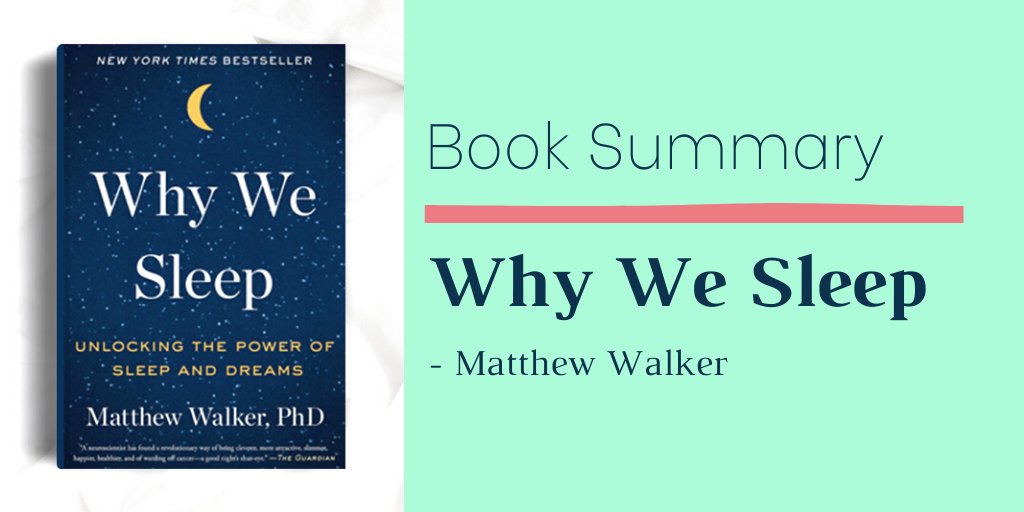Why We Sleep by Matthew Walker.
A 10 Tweet Summary of a book that will change your evenings forever.
@sleepdiplomat @threadreaderapp
A 10 Tweet Summary of a book that will change your evenings forever.
@sleepdiplomat @threadreaderapp
Sleep is a strange phenomenon from an evolutionary perspective. It makes us spend 1/3 of our lives unconscious - increasing our risk of being killed.
To compensate, it must have serious benefits.
New research shows that almost every bodily function benefits from sleep.
To compensate, it must have serious benefits.
New research shows that almost every bodily function benefits from sleep.
There are 2 types of sleep: REM & NREM (Non-REM). We sleep in cycles of both these.
- NREM sleep helps shift memories from short term areas to medium & long term areas in the brain.
- REM sleep helps make connections between internal memories in the brain.
- NREM sleep helps shift memories from short term areas to medium & long term areas in the brain.
- REM sleep helps make connections between internal memories in the brain.
The domestication of Fire & its impact on our sleep could be the reason for our world domination.
Apes sleep on trees, but they can& #39;t sleep too deeply as they might fall & perish.
Our mastery of Fire allowed us to sleep on floors & still keep safe from other creatures.
Apes sleep on trees, but they can& #39;t sleep too deeply as they might fall & perish.
Our mastery of Fire allowed us to sleep on floors & still keep safe from other creatures.
Sleeping safely on floors allowed humans to sleep deeply & get more REM sleep.
This resulted in a more complex brain structure that could do advanced tasks including maintaining complex social relationships.
This made mass cooperation & dominance of the food chain possible.
This resulted in a more complex brain structure that could do advanced tasks including maintaining complex social relationships.
This made mass cooperation & dominance of the food chain possible.
We are all wired to sleep for 7 to 8 hours at night & 30-45 minutes in the afternoon.
Each of us has an inbuilt body clock which maintains our natural sleep cycles:
- 40% of us are & #39;morning people& #39;
- 30% of us are & #39;night owls& #39;
- 30% of us fall somewhere in between
Each of us has an inbuilt body clock which maintains our natural sleep cycles:
- 40% of us are & #39;morning people& #39;
- 30% of us are & #39;night owls& #39;
- 30% of us fall somewhere in between
Daily life is unfair for the 60% of people that are not & #39;morning people& #39;. They are forced to wake up early and suffer a host of drawbacks.
Under-slept people are less productive, less motivated, less creative, less happy, & more likely to have health problems.
Under-slept people are less productive, less motivated, less creative, less happy, & more likely to have health problems.
Daylight savings time disrupts the sleep of 1.5 billion people who sleep for an hour less on a particular day.
Reports of heart attacks spike the following day.
The opposite happens at the end of this period when people sleep for an extra hour - heart attacks plummet.
Reports of heart attacks spike the following day.
The opposite happens at the end of this period when people sleep for an extra hour - heart attacks plummet.
Schools that have delayed start times have seen a drastic increase in student test scores & learning ability.
Sleep converts short term memories into medium & long term memories.
It acts as a & #39;refresh& #39; button that clears the cache of the brain & allows for new learning.
Sleep converts short term memories into medium & long term memories.
It acts as a & #39;refresh& #39; button that clears the cache of the brain & allows for new learning.
Sleep is not the absence of wakefulness. It is far more than that. It is a complex, metabolically active series of unique stages.
Sleep reduces your risk of heart attacks, strokes & dementia. It helps you live longer, learn better, feel happier & be more productive.
Sleep reduces your risk of heart attacks, strokes & dementia. It helps you live longer, learn better, feel happier & be more productive.
The best way of improving sleep is going to bed & waking up at the same time every day.
Besides this, avoid exercising late in the day. Avoid alcohol & large dinners before bed.
Relax & take a hot bath before you hit the pillow. Keep your bedroom cool, dark & gadget-free.
Besides this, avoid exercising late in the day. Avoid alcohol & large dinners before bed.
Relax & take a hot bath before you hit the pillow. Keep your bedroom cool, dark & gadget-free.

 Read on Twitter
Read on Twitter


